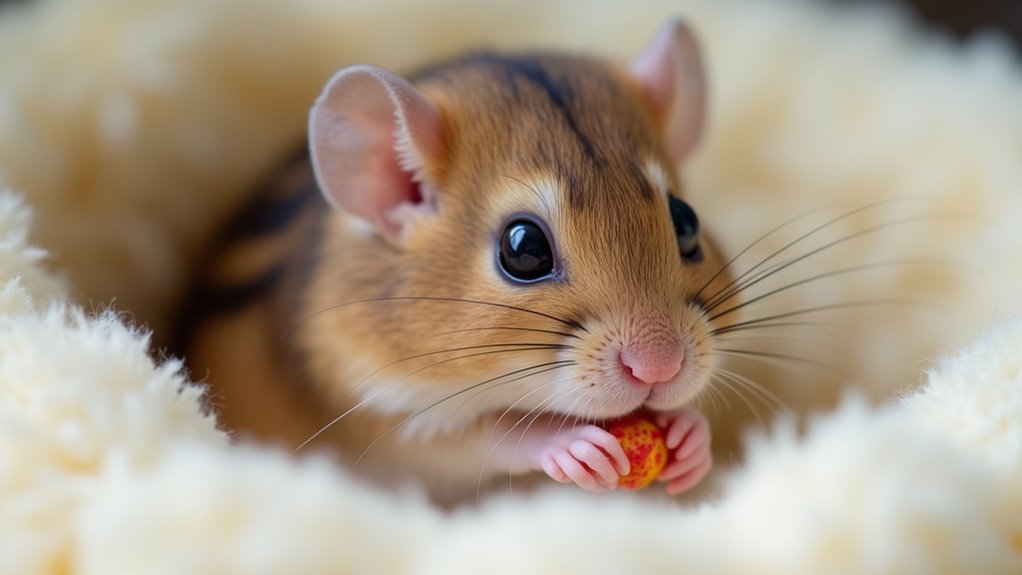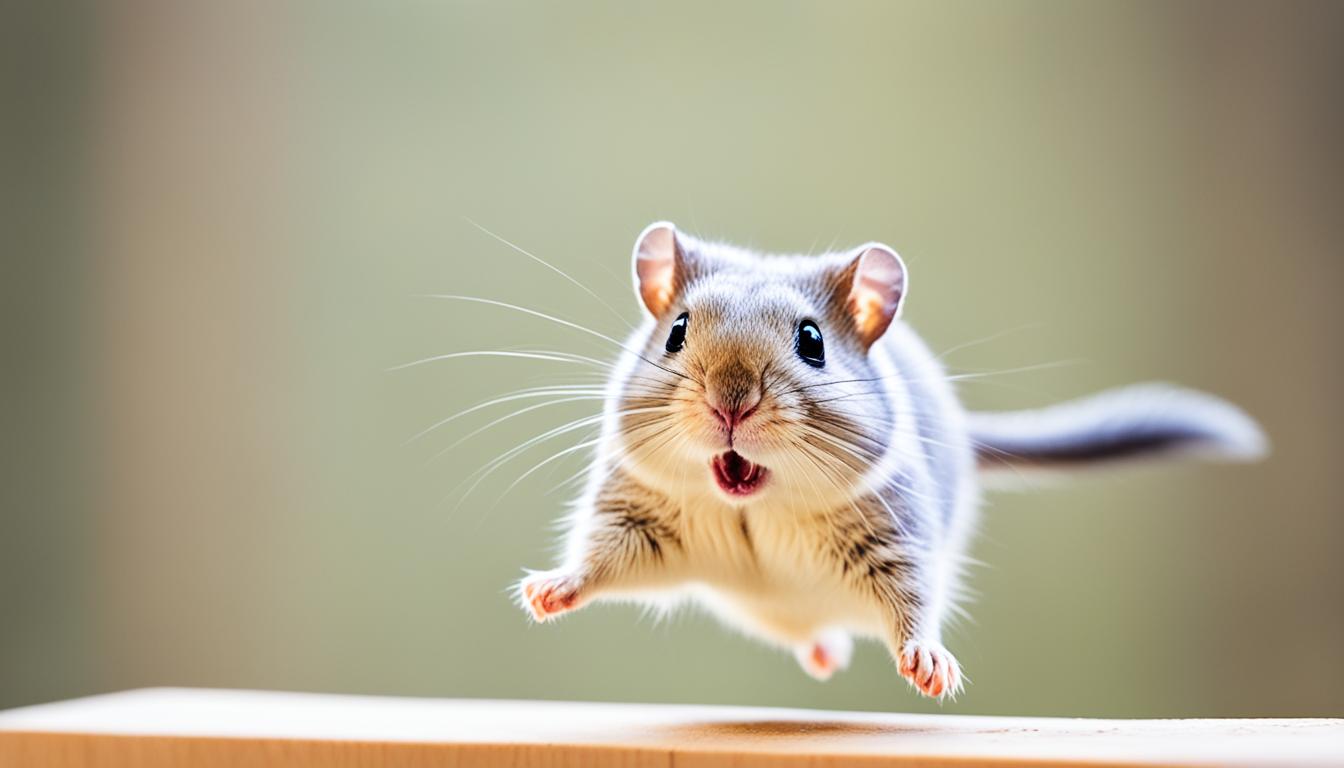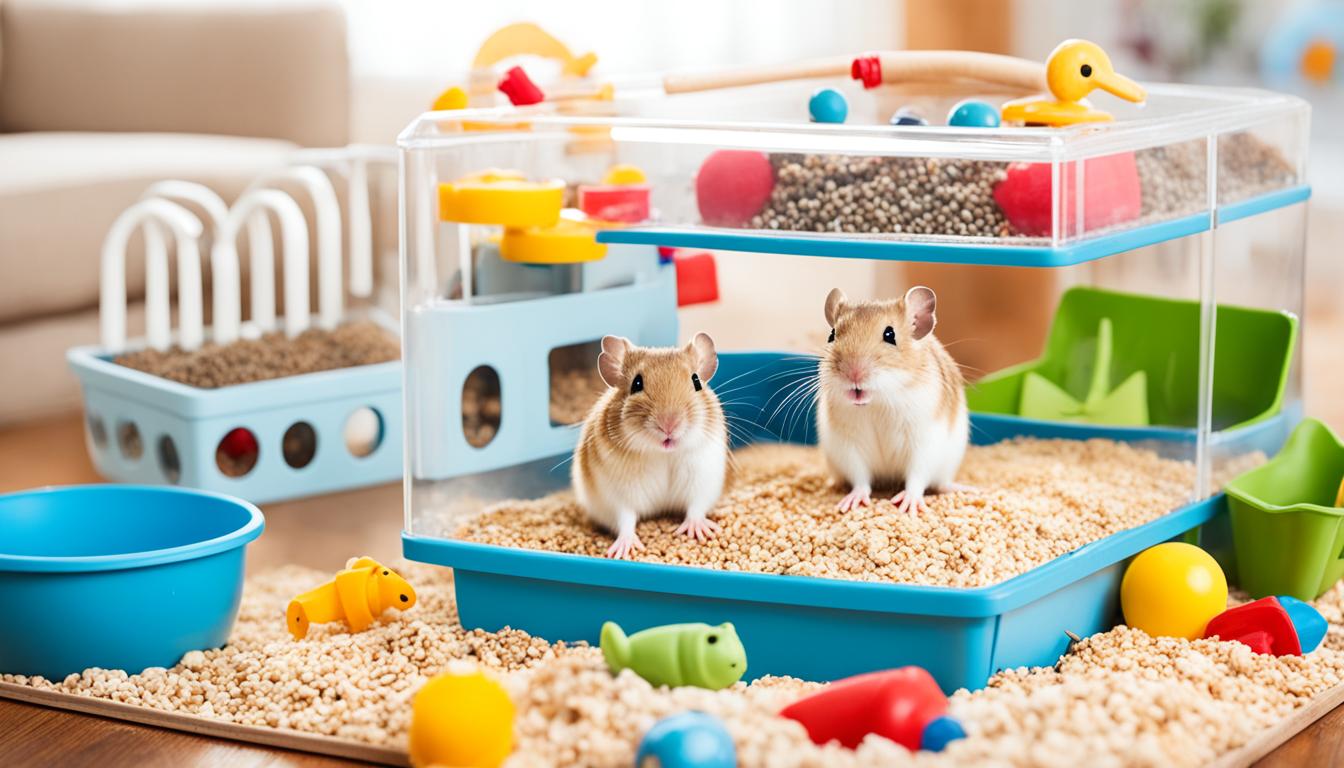To keep your gerbil healthy, watch for signs like lethargy, loss of appetite, sneezing, or diarrhea. Active, curious behavior is a good sign, but sudden changes may indicate illness. Regularly check their cage for cleanliness, provide a balanced diet, and guarantee fresh water is available. Early detection of issues like respiratory problems or parasites is key. Stay informed; more tips can help you prevent diseases and ensure your gerbil’s well-being.
Key Takeaways
- Monitor for lethargy, loss of appetite, sneezing, or diarrhea as signs of potential health issues.
- Watch for excessive grooming, hair loss, or skin irritations indicating underlying problems.
- Observe changes in activity levels or unusual behaviors to detect early illness signs.
- Ensure proper diet, clean environment, and fresh water to prevent common diseases.
- Seek prompt veterinary care if symptoms like hunching, difficulty breathing, or persistent discomfort appear.

Are you aware of the key factors that keep your gerbil healthy? One of the most important aspects is understanding their behaviors and symptoms, which can reveal early signs of illness. Watch how your gerbil acts daily—are they active, curious, and engaging with their environment? If your gerbil suddenly becomes lethargic, stops eating, or shows signs of difficulty breathing, these are red flags. Changes in behavior often indicate underlying health issues, so paying close attention can help you catch problems early. Additionally, note any abnormal behaviors like excessive scratching, hair loss, or frequent grooming, which might point to skin infections or parasites.
Watch your gerbil’s daily behavior for early signs of health issues.
Equally essential is the role of diet and nutrition. A well-balanced diet prevents many health problems and supports your gerbil’s immune system. Make certain they have access to a mix of high-quality commercial gerbil food, supplemented with fresh vegetables, grains, and occasional treats like mealworms. Avoid feeding them sugary or fatty foods, as these can lead to obesity and other metabolic issues. Fresh water must always be available and replaced daily to keep them hydrated. Proper nutrition not only keeps their coat shiny and their teeth healthy but also boosts their overall vitality, reducing the risk of illnesses like dental disease or malnutrition. Incorporating AI-powered health monitoring tools can help track behavioral changes and alert you to potential health concerns early.
Monitoring for digital literacy in your gerbil’s environment, such as safe and stimulating toys, can also positively influence their mental well-being and reduce stress-induced health problems. Understanding your gerbil’s behaviors and symptoms, alongside providing the right diet and nutrition, forms the foundation of good health care. If your gerbil shows signs of discomfort—such as hunching, sneezing, or diarrhea—don’t ignore these symptoms. Promptly consult a veterinarian experienced with small animals to determine the cause and receive appropriate treatment. Regularly check their cage to confirm cleanliness and a safe environment, which also impacts their health. Stress from an unclean or overcrowded cage can weaken their immune system and make them more susceptible to disease.
Incorporate daily observation into your routine to catch subtle changes early. Maintain a consistent feeding schedule, provide fresh water, and offer enrichment to keep them mentally stimulated and physically active. When you understand their behaviors and symptoms and prioritize proper diet and nutrition, you create a strong foundation for your gerbil’s health. Being proactive and attentive helps prevent many common illnesses and ensures your little companion stays happy and healthy for years to come. Additionally, seeking guidance from veterinary professionals knowledgeable in small animal health can provide valuable insights for preventing and managing illnesses.
Frequently Asked Questions
How Often Should I Schedule Veterinary Check-Ups for My Gerbil?
You should schedule veterinary check-ups for your gerbil at least once a year to guarantee it’s healthy. Regular grooming helps prevent matting and skin issues, while maintaining bedding hygiene reduces risks of infections. Keep an eye on your gerbil’s behavior and appearance between visits, and consult a vet if you notice any signs of illness. Consistent care keeps your gerbil happy, healthy, and thriving.
What Are Natural Remedies for Common Gerbil Illnesses?
Think of herbal remedies and dietary supplements as your gerbil’s health toolkit. You can try adding small amounts of chamomile or peppermint to their water for calming effects, or offer vitamin-rich foods to boost immunity. These natural remedies can help manage minor illnesses, but always check with your vet first. Remember, a gentle touch and attentive care are your best allies in keeping your tiny friend healthy and happy.
Can Diet Changes Prevent Gerbil Health Issues?
You can prevent gerbil health issues through diet management, ensuring they get a balanced mix of grains, seeds, and fresh veggies. Pay attention to behavioral cues, like lethargy or changes in activity, which might indicate dietary problems. By providing proper nutrition and observing your gerbil’s behavior, you reduce the risk of illnesses and promote overall well-being, keeping your furry friend healthy and happy.
How Do I Differentiate Between Normal Behavior and Illness Symptoms?
Pay close attention to your gerbil’s behavior changes and activity levels. If they suddenly seem sluggish, hide more, or lose interest in their usual activities, these are signs something’s wrong. Normal behaviors include curiosity and regular grooming. Sudden shifts, such as lethargy or excessive scratching, signal potential illness. Monitoring these movements and moods helps you distinguish between normal antics and alarming symptoms, enabling prompt, preventative care.
Are There Specific Signs of Aging in Gerbils I Should Watch For?
You should watch for gerbil aging signs like decreased activity, weight loss, and thinning fur, which are common gerbil age indicators. As your gerbil gets older, it may sleep more, move slowly, or show less interest in play. These gerbil aging signs help you understand its health and comfort. Keep an eye on these changes to provide proper care and ensure a happy, healthy life for your aging gerbil.
Conclusion
Taking care of your gerbil’s health is vital for a happy, long life together. Regularly check for signs of illness like lethargy or unusual behavior, and keep their environment clean. Did you know that gerbils can live up to 4 years? That’s a lot of time to enjoy their playful personality—so staying vigilant about their health guarantees those years are filled with joy and good health for your tiny friend.









